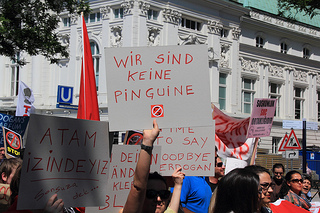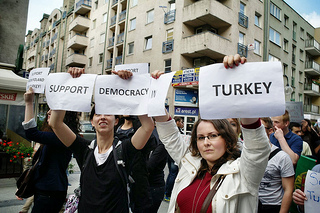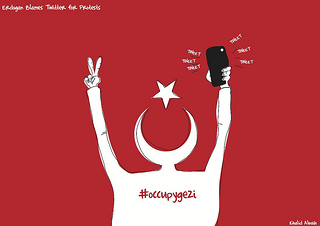The recent unrest in Turkey has left eight dead and more than 4,000 injured as well as exposed political divides and ineptitudes in the country that straddles Europe and Asia.
But the consequences of the massive protests, which grew from a movement to stop the destruction of Istanbul's Gezi Park for a redevelopment project in Taksim Square, have extended far beyond the borders of Turkey.
Members of the European Union, led by Germany, have used these clashes as an excuse to postpone negotiations on Turkey's entry into the European Union from late June until autumn. The website Cameroonvoice [fr] specified:
La chancelière Angela Merkel a déclaré la semaine dernière que les événements en Turquie ne correspondaient pas aux “notions européennes de la liberté de réunion et d’expression”.
The Chancellor Angela Merkel declared last week that the events in Turkey do not correspond to “European ideas of freedom of assembly and expression.”
At the same time, the events in Turkey seem to have generated questions about identity in France and throughout Europe tied to the prospect of Turkey's entry into the European Union. The French are asking themselves variations of, “Do we share the same values?”
Not so different?
Many French media outlets have based their analyses of the EU matter on the events of June in Turkey, trying out a number of different analogies. As if this large neighbour, who might soon become part of the family, and its revolts offered the French a mix of complete exoticism and familiar reality. As Henri Goldman writes on his blog [fr]:
Un peu partout, on compare Taksim à Tahir, le Printemps turc au Printemps arabe. Sur les images qui circulent, ce sont les mêmes couches sociales,– étudiants, classes moyennes instruites… – qui tiennent le haut du pavé. Celles-ci nourrissent leurs aspirations à partir du kit culturel cosmopolite qui se diffuse par internet et constitue désormais le bagage commun des courants « branchés » des sociétés en transition. Le mode de mobilisation aussi les rapproche : des mots d’ordre lancés à travers la toile et qui essaiment en réseaux sans quartier général où n’importe quelle consigne est reprise pour autant qu’elle réponde à l’attente, indépendamment de qui la lance.”
Everywhere, Taksim is being compared to Tahir, the Turkish spring to the Arab spring. In the images making the rounds, we see the same social groups – students, educated middle classes… – leading the field. They feed their ambitions with the cosmopolitan cultural kit spread over the Internet and which now forms the stock ideas of the “fashionable” schools of thought in societies in transition. The means of mobilisation brings them together too: slogans begun on the Internet which spring up in networks without headquarters, where any instructions are repeated so long as they correspond to expectations, no matter who starts them.
Others, particularly in France, have seen the protest as a new “May '68“, referring to the Paris social revolution of 1968, sometimes in a desire to identify with the protesters. Chems Eddine Chitour's blog [fr] does just that:
“Les médias occidentaux pensaient et pensent que le dernier «domino» allait tomber. Ils ont présenté cette colère comme celle d’une Turquie ultralaïque qui en a marre de l’AKP et tout est fait pour forcer l’analogie avec les places Tahrir et partant avec les tyrans arabes. Pas un mot d’une analogie avec mai 1968 en Europe au sortir des trente glorieuses bâties sur la sueur des émigrés. Quand Daniel Cohn-Bendit et ses camarades avaient mis à mal le gouvernement de De Gaulle ce n’était pas pour du pain comme la plupart des révoltes dans les pays arabes, mais c’était pour secouer un ordre ancien en interdisant d’interdire…”
Western media outlets thought and think that the last ‘domino’ was going to fall. They have presented this anger as that of an ultra-secular Turkey, fed up with the AKP, and the analogy with Tahrir Square and the doing away with Arab tyrants is pushed to its limits. Not once has the analogy been drawn with May 1968 in Europe, at the end of the so-called golden years, built on the sweat of immigrants. When Daniel Cohn-Bendit and his fellow students took action against De Gaulle's government, it was not because they were starving, like most of the uprisings in Arab countries, but to shake up an old order by not allowing it to suppress them…
The European Parliament officially condemned the brutal repression of the demonstration. But Ex-Expat [fr] commented on a France 24 article which describes the ongoing demonstration:
Les seuls Européens en Turquie sont ceux au Taksim et leurs sympathisants!”
The only Europeans in Turkey are those in Taksim Square and their supporters!
A video showing the protesters in Taksim Square singing “Do you hear the people sing?” taken from the musical Les Misérables about the Paris uprising of 1832, demonstrates the link between the protesters and Europe:
http://www.youtube.com/watch?v=FctAww-4p9k
From Gezi Park to Turkey's EU integration

“Taksim ist überall!” – “Taksim is everywhere!” Hamburg, Germany, 8 June, 2013. By Rasande Tyskar on Flickr, CC BY-NC 2.0
The “European values” Angela Merkel spoke of are the values picked up by online media outlets, sliding almost systematically from the subject of the Gezi and Taksim demonstrations to that of Turkey's integration into the EU. Franck Proust [fr], a member of the European Parliament for the French UMP Party, reiterated the position of the French right-wing. Coralie Morallet explains [fr] on the regional news website Objectif Gard (Southern France):
Un accord de partenariat: oui, mais l’adhésion à l’Europe : Non! La Turquie n’a rien d’européenne. Nous ne partageons pas la même culture, ni les mêmes racines judéo-chrétiennes, ni les mêmes aspirations politiques“
A partnership agreement: yes, but accession to Europe: no! Turkey is not European. We don't share the same culture, nor the same Judeo-Christian roots, nor the same political aspirations.
A comment from Joël Toussaint [fr] responded:
L’Europe partage des racines judéo-chrétiennes qui ont été plantées… en Turquie! Le premier Concile de Nicée date de 325 et le premier Concile de Constantinople fut tenu en 381. (…) L’arrogance trouve sa racine dans l’ignorance… M. Proust saute à pieds joints sur le prétexte que lui fournit Erdogan et met ainsi le pied dans le plat. Il procède à un exercice d’amalgame entre le peuple turc et ses dirigeants. La démagogie politique dans toute sa splendeur!”
Europe shares Judeo-Christian roots which were sown… in Turkey! The first Council of Nicea was in 325, and the first Council of Constantinople took place in 381. (…) Arrogance is rooted in ignorance. Mr. Proust jumps feet first into the pretext given by Erdogan, and ends up putting his foot in it. He is conflating the Turkish people with their leaders. Political grandstanding in all of its glory!
The majority of comments were very pessimistic [fr] as to the outcome of the integration process:
(…) Vouloir absolument européaniser le digne successeur de l’empire ottoman est une vue de l’esprit, une vision idyllique de la future Union européenne. Ce n’est pas parce 5% de la population adhère aux idées et valeurs de l’UE que les 95% d’anatoliens vont le faire, ni parce que Constantinople est devenu Ankara que la mentalité des dirigeants ottomans – kémalistes ou islamistes (modérés ?), a changé.”

Demonstration of solidarity with #OccupyGezi in Wroclaw, Poland. By David Krawczyk on Flickr – CC BY-NC-SA 2.0
(…) Insisting on europeanising the worthy successor of the Ottoman Empire is an illusion, an idyllic vision of the future of the European Union. Just because 5 percent of the population adhere to the ideas and values of the EU doesn't means that 95 percent of Anatolians will do so. Just because Constantinople has become Ankara, it doesn't means that the mentality of the Ottoman leaders – whether Kemalist or (moderate?) Islamist – has changed.
But there are some who turn the spotlight on the values shared with the protesters themselves across European borders: against police violence, arbitrary detention of protesters and journalists, and for freedom of expression and freedom of assembly. As Cameroonvoice [fr] affirmed:
De l’Azerbaïdjan au Sénégal tout le monde compatit avec les manifestants de la place Taksim, pas avec Erdogan”, conclut Hakan Günes, professeur de politologie à l’université de Marmara.”
“From Azerbaijan to Senegal, everyone sympathizes with the protesters in Taksim Square, not with Erdogan”, concludes Hakan Günes, Professor of Political Science at the University of Marmara.
And the more that Turkey's Prime Minister's Recep Tayyip Erdoğan turns to conspiracy theories [fr] to denounce the influence of the European Union, Western media, social networks (especially Twitter), the more he risks isolating himself on the world stage. It is ironic, then, that it it is precisely with regards to the fear of the other and conspiracy theories that Sema Kaygusuz, a Turkish writer [fr], sees similarities between Turkish and American societies:
La Turquie est un pays où tout le monde a peur de l’autre. Les Kémalistes ont peur des islamistes, les islamistes ont peur des laïques, les femmes ont peur des hommes, les enfants ont peur des adultes… C’est la mentalité américaine : on est toujours en danger.”
Turkey is a country where everyone fears the other. Kemalists fear Islamists, Islamists fear secularists, women fear men, children fear adults… It's the American mentality: we are always under threat.








4 comments